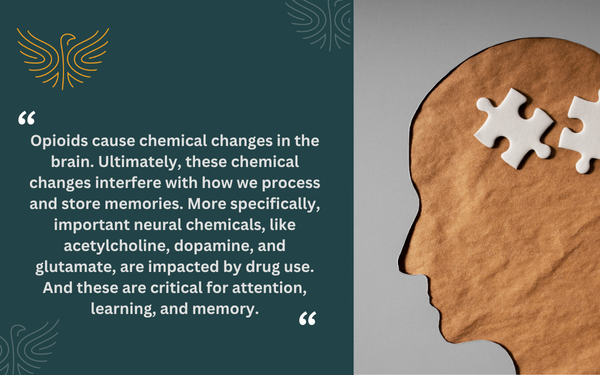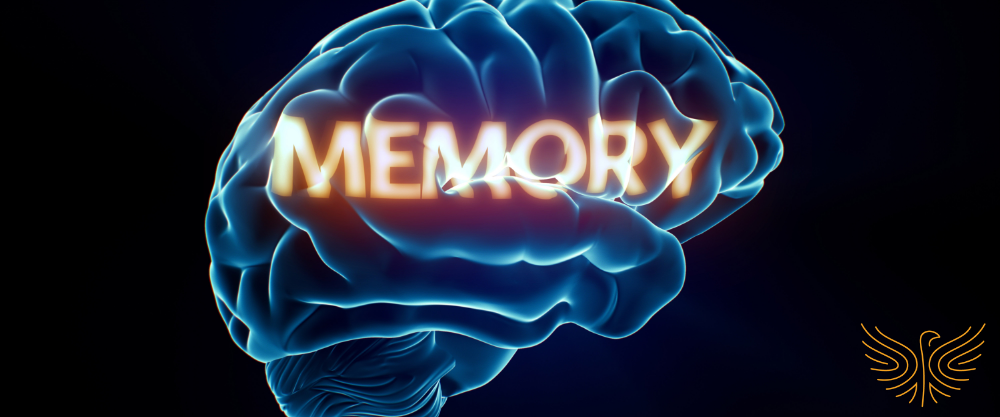Surprisingly, even when used as directed, some prescription drugs can cause memory loss as a side effect. With that in mind, it should come as no surprise that drug addiction is also associated with memory loss and difficulty with memory recall.
In particular, research indicates that individuals with opioid dependence experience deficits not just in memory—but also in attention and executive function. Other research also suggests that these deficits can last for years, especially in older adults with prolonged opioid use.
So, why does this happen? Is it permanent? What should you expect during recovery? In this article, we answer these questions and more.
_______________________________________________________
Why Opioid Use Causes Memory Loss
Opioids cause chemical changes in the brain. Ultimately, these chemical changes interfere with how we process and store memories. More specifically, important neural chemicals, like acetylcholine, dopamine, and glutamate, are impacted by drug use. And these are critical for attention, learning, and memory.

It’s also been shown that opioids, such as heroin, reduce gray matter volume. This reduction happens in areas of the brain such as the prefrontal cortex—which is involved in planning, judgment, and decision-making—as well as the amygdala and hippocampus, which are involved in emotional regulation and memory formation.
On top of the above, drug use triggers widespread inflammation throughout the body. Inevitably, this can lead to an increased frequency of illness and damage to nerve cells involved in memory formation. In turn, it’s common for individuals using drugs (and going through withdrawal and early recovery) to experience brain fog, slower cognition, and, again, difficulty with memory recall.
And because of these neural effects (as well as the potential for overdosing), the sooner you get help, the better. In fact, prolonged or repeated opioid use is even linked to an increased risk of dementia later on in life.
_______________________________________________________
Do Other Drugs Cause Memory Loss?
Beyond opioids, memory loss can occur when taking other drugs and even prescription medications—especially with chronic use. Here’s a more detailed breakdown:
Benzodiazepines
While commonly prescribed for anxiety and insomnia, taking benzodiazepines long-term (including Xanax, Valium, and Ativan) can lead to difficulty forming new memories. It can even eventually cause memory disorders, particularly in the senior population.
These drugs are also linked to depression, which can impact cognitive function. This is why physicians are typically cautioned against prescribing these medications for prolonged periods. Many new recommendations involve acute prescriptions, helping to deter the negative consequences.
Alcohol
Excessive alcohol use is associated with increased memory impairment. While in college, many might laugh off a night where they “blacked out,” continued instances of this can disrupt the hippocampus region of the brain—which is important for creating new autobiographical memories (memories that involve your past personal experiences, events, and facts).
Additionally, Wernicke-Korsakoff syndrome, a memory disorder, can be caused by frequent and excessive alcohol use.
Cannabis (Marijuana)
THC, the active component in cannabis, binds to the cannabinoid receptors in the hippocampus. Like other drugs, this interference with this area of the brain can impair short-term memory and recall. This is particularly true when it comes to working memory. And with excessive and heavy use, it might not be just short-term.
Stimulants
Stimulants, like meth and cocaine, excite the central nervous system, often leading to increased energy, mood, and alertness. But using these substances can actually have long-term cognitive deficits, including problems with attention, working memory, and learning. Meth, in particular, has been linked to structural brain changes and persistent cognitive impairment.
Anticholinergic Medications
This category of medications includes antihistamines, tricyclic antidepressants, and sleep aids. These drugs block acetylcholine—a neurotransmitter that’s important for memory, attention, and muscle function. However, these drugs rarely lead to addiction. Although, in some cases, they can be linked to psychological dependence and a physical tolerance (specifically in relation to sleep aids).
_______________________________________________________
How To Overcome Drug-Related Memory Loss
If you’re struggling with a drug addiction, it can be hard to admit that you need help. However, seeking out treatment is associated with increased health and psychological outcomes. And recovery is possible, no matter how dire the circumstances might feel.
At the end of the day, the best way to tackle memory loss associated with a drug addiction is to address the addiction itself. This will initially involve detoxing from the abused substance. From there, counseling and other therapies, such as CBT, will help you address the underlying causes of addiction.
At Freedom Recovery Centers (FRC), our team is here to guide you every step of the way. We believe your best days are still ahead of you. Take that first step today and call us at 804-635-3746 or fill out our online form.
Frequently Asked Questions (FAQs)
What drug causes the most memory loss?
Opioids, benzos, and alcohol are drugs linked with the most significant cognitive and memory impairments.
Can brain damage from drugs be reversed?
Some cognitive damage from drug use can improve with sustained abstinence, healthy lifestyle changes, and therapy (all of which are learned and implemented throughout rehab and recovery). However, in severe or long-term cases, certain impairments may be permanent.
.svg)






.svg)

.svg)



.svg)
